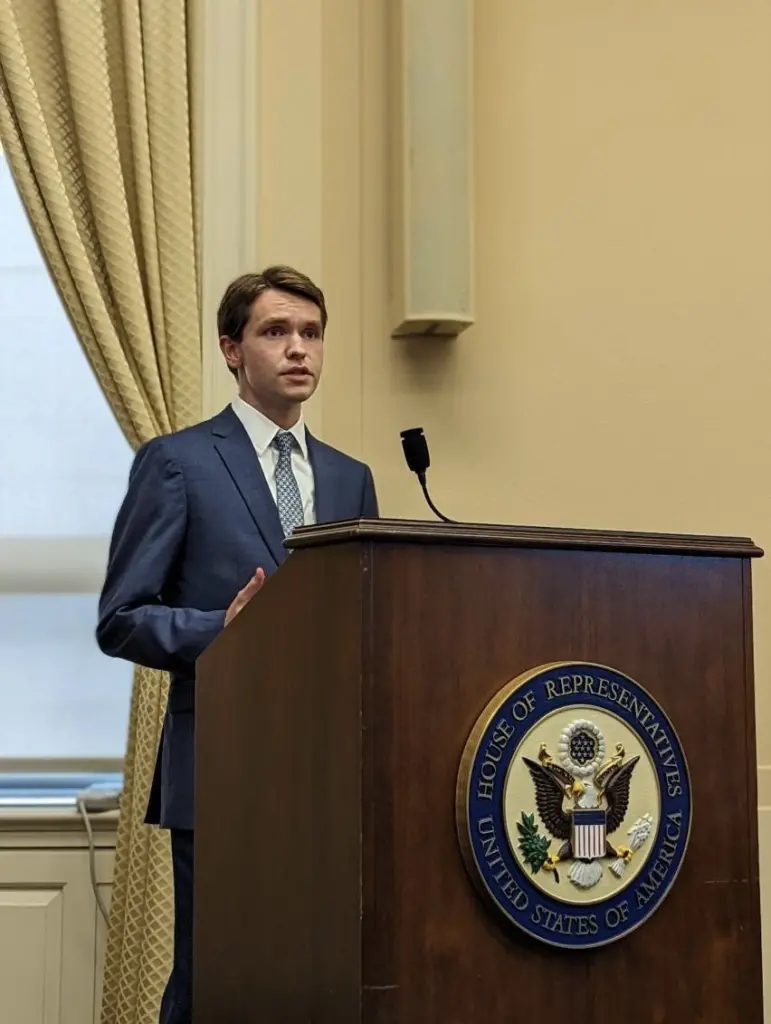Since his freshman year at the University of Wisconsin-Madison, Evan Erickson has worked as a researcher in a chemical engineering lab, learning in detail about how to optimize energy, waste and recycling systems. The experience has taught the chemical engineering senior the ins and outs of academic research and has been a boot camp on the future of sustainability. But over his four years in the lab, Erickson has also thought deeply about the wider impact of that work, wondering how decisionmakers hear about, understand and put impactful research—like his—into action.
That’s why, in summer 2023, Erickson traveled to Washington, D.C., for an eye-opening internship with Washington Internships for Students of Engineering (WISE), a multidisciplinary program sponsored by several scientific societies that shows engineers of all stripes how science and scientists can work in and with government. “Through undergraduate research, I started thinking about larger policy questions relevant to developing a national infrastructure for plastics recycling,” he says. “How do we treat emerging technologies in terms of environmental regulation? How do we decide between all the different options for processing plastic waste? These seemed like policy questions that could be informed by my current research. I wanted an opportunity where I could combine the two.”
That concern with the wider impact of science has been with Erickson for a long time. When deciding where to attend college, the Brookfield, Wisconsin, native was drawn to UW-Madison for its strong engineering program, but also by the dedicated second major in environmental studies offered by the Nelson Institute. With that second major, he took courses on climate change governance, life-cycle assessment and environmental history, all of which gave him a broad view of how chemical engineering can impact the environment.
 As part of his WISE internship, Evan Erickson presented his policy recommendations on national recycling infrastructure to congressional staffers and other interested government leaders. Submitted photo.
As part of his WISE internship, Evan Erickson presented his policy recommendations on national recycling infrastructure to congressional staffers and other interested government leaders. Submitted photo.
Erickson began working in the lab of Baldovin-DaPra Professor Victor Zavala as part of the Undergraduate Research Scholars Program his freshman year, and continued on with the lab the rest of his undergraduate career, studying energy and waste systems, using modeling to figure out the answers to economic and environmental questions.
In October 2023, that research led to a paper on which Erickson is first author, which the lab hopes to publish soon. The research looks at the economic and environmental benefits of creating a national plastic chemical recycling network. That experience will help Erickson as he applies to graduate schools. “Working with the lab group has become a major part of my undergraduate career, and it has absolutely been worth it,” he says. “It has introduced me to types of work and the types of questions that I want to continue with in graduate school.”
Erickson sees the nine-week-long WISE program, aimed at upper-level engineering undergraduates and graduate students, as a way to bring together his interests. The internship focuses on the process government officials use to make decisions on complex technological issues, and how engineers can contribute to the legislative process and regulatory public policy decision-making.
The core of the program is a research project in which participants write public policy recommendations and present them at the end of the internship. Erickson says the program also introduced him to mentors from AIChE, the chemical engineering professional society, who helped him find resources for his policy project on chemical recycling. Those connections also opened up new opportunities; in November 2023, Erickson attended the AIChE annual meeting and presented his WISE internship work and his paper with the Zavala lab.
While both of those elements were helpful, Erickson says the most impactful aspect of the internship was simply meeting a wide variety of people in Washington, D.C., who influence science policy. “It was a surprise to me to learn about all the different people with interests in science policy, the backgrounds they come from and what they are doing right now,” he says. “There are so many different opportunities for people with technical backgrounds to get into policy spaces across all branches of government, from legislative offices to executive agencies, which was really exciting for me to realize.”
Now, as he prepares to attend graduate school, Erickson says he will keep those potential career options in mind. And the fact that he really enjoyed the Washington, D.C., amenities and walkability doesn’t hurt. “The WISE internship is a really unique, informative and affirming experience for any engineer who’s interested in connecting their work to public policy questions,” he says.
Featured image caption: Evan Erickson (far right) was one of four students sponsored by AIChE and ASTM to participate in the Washington Internships for Students of Engineering internship. Other attendees are (from left to right) Ryan Alimento, University of Southern California; Aicha Sama, Brown University; and Courtney Cochran, Mississippi State University. Credit: AIChE.